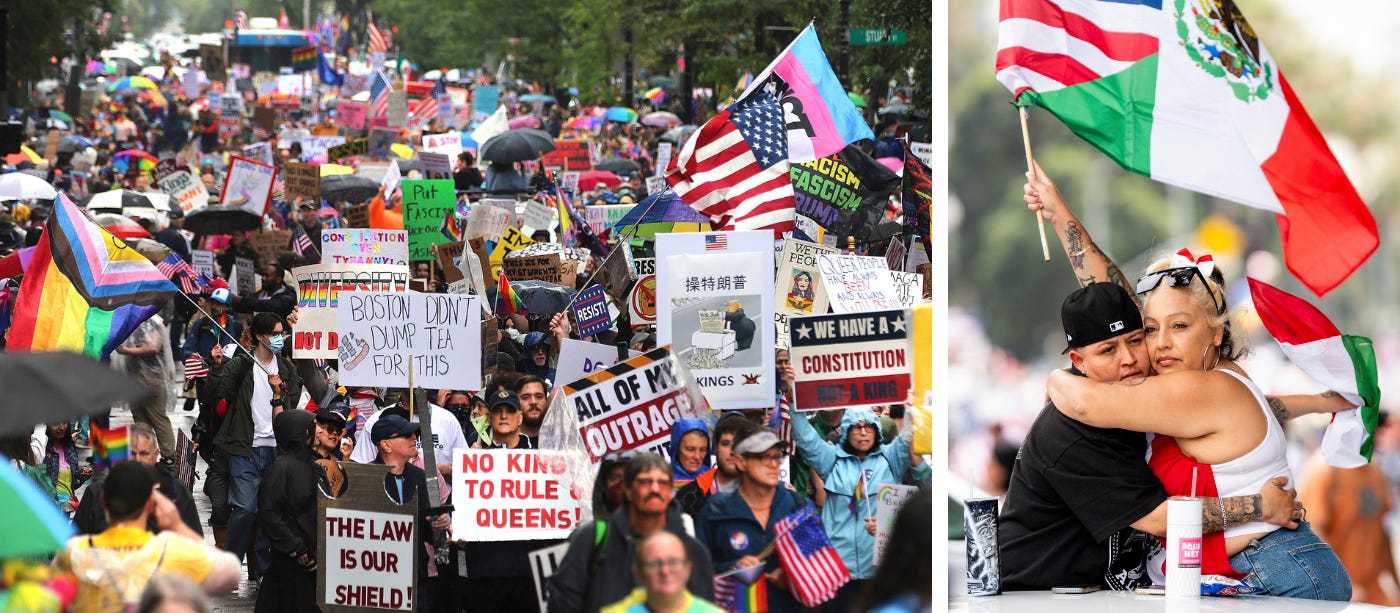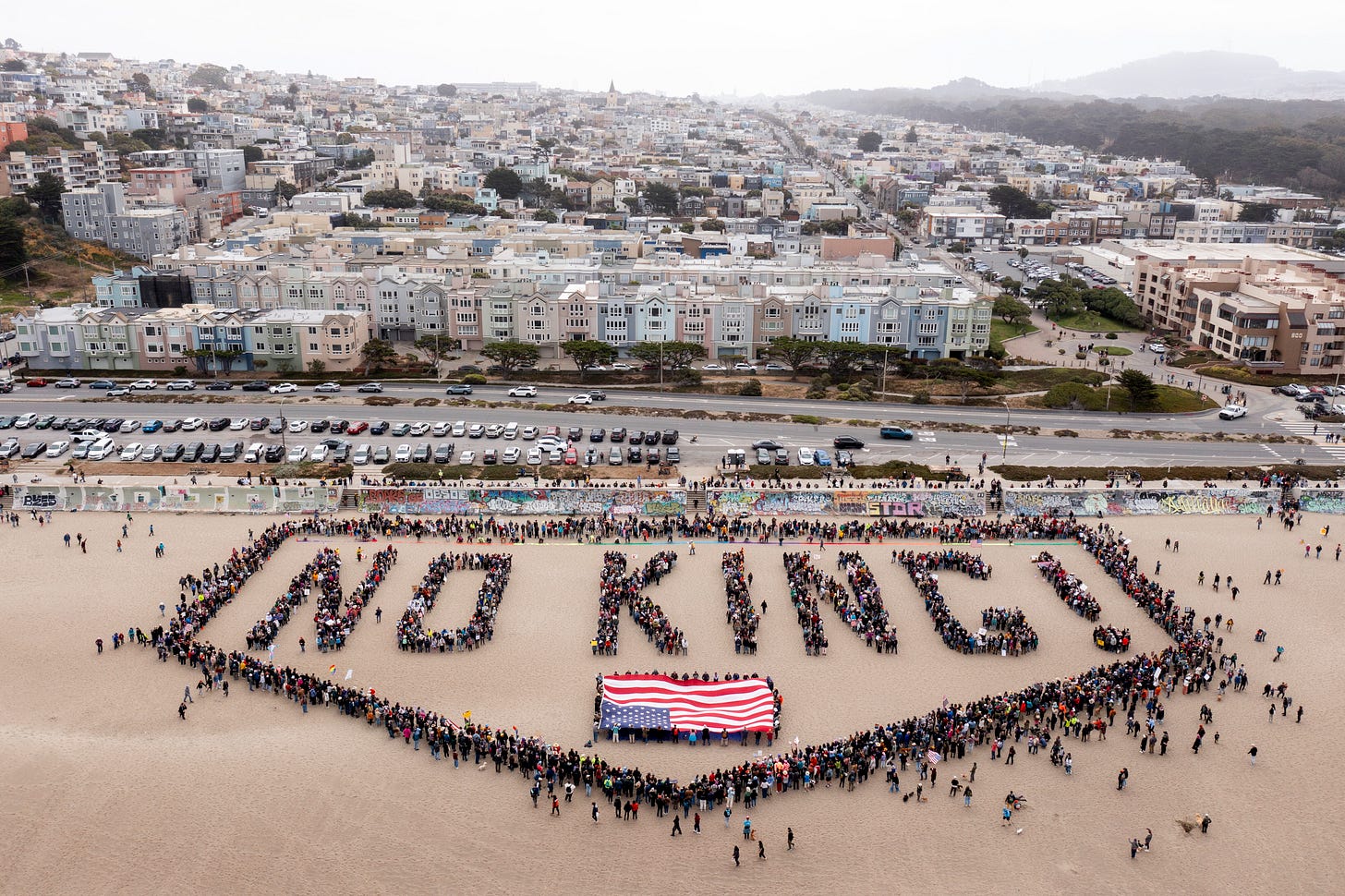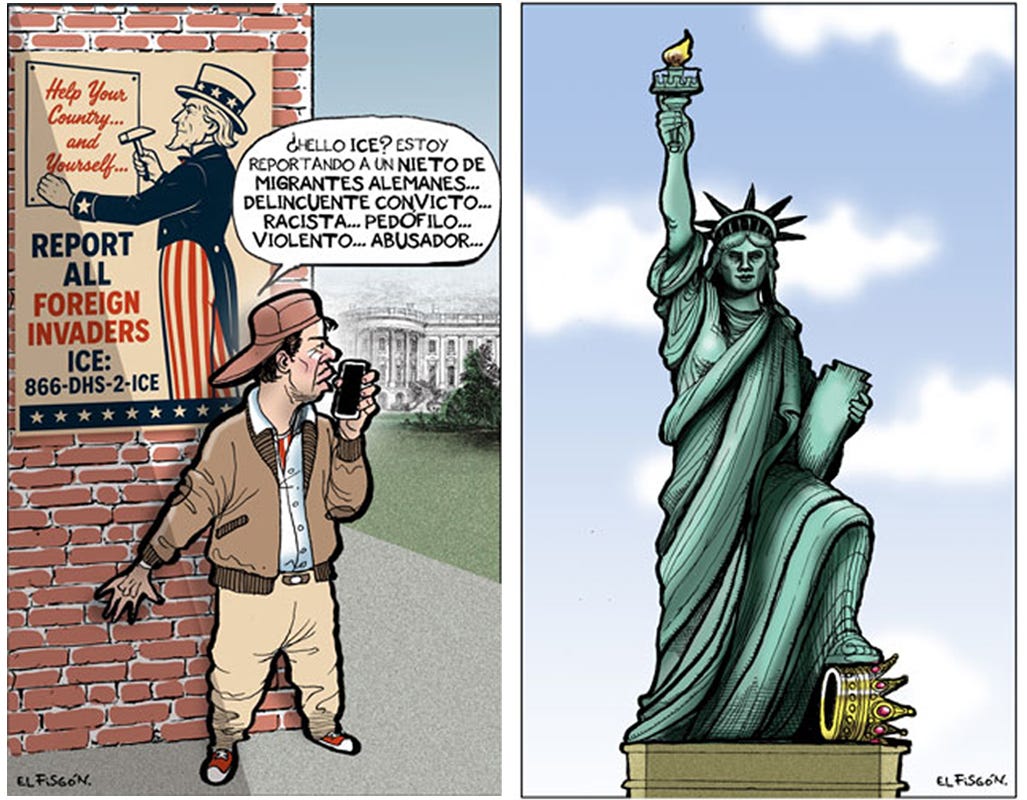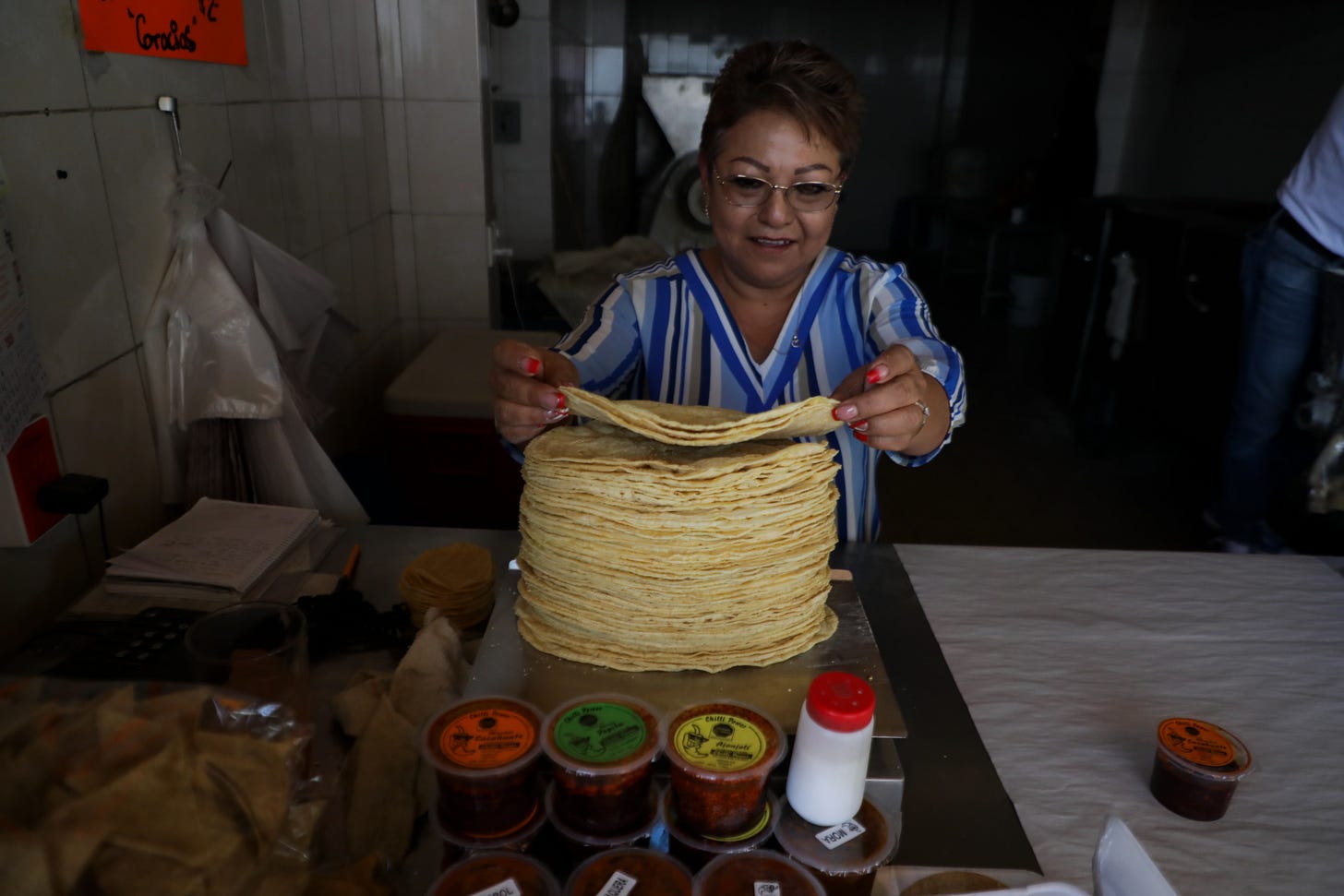20 June 25 | A Failed King Is More Dangerous
Also in this edition: Cartoonists respond to the war in the Middle East. Soundtracks of dreams and solidarity. Mexico: 10 women murdered every day. The final stretch toward the 2026 World Cup.
Lea La Jornada Internacional en español aquí.
Suicidal Xenophobia
Donald Trump’s immigration policy is so far failing in the effort to put in place “the largest mass deportation in history,” raising the risk that his frustration may lead to even more dangerous and cruel measures. The primary justification for these anti-immigrant policies is the claim that criminal migrants are invading the U.S., destroying public safety, the economy, and culture, while murdering, raping, and drugging innocent Americans.
But in recent months, the vast majority of the nearly 100,000 immigrants deported by this administration were not violent criminals, but rather neighbors, friends, and community members without any criminal background. In fact, immigrants commit fewer crimes than U.S. citizens.
Meanwhile, resistance to anti-immigrant measures in Los Angeles and other parts of the country has fueled the largest wave of opposition to Trump since he entered the White House. In mid-June, demonstrators marching under the banner “No Kings,” organized what may have been one of the largest national protests in U.S. history.

Businesses that rely on immigrant workers—agriculture, restaurants, construction, child care, and health care, among others— are demanding that their workers be allowed to stay. In response to pressure from these business leaders dependent on immigrant labor, Trump ordered a pause of raids on farms, hotels, and restaurants—but days later that order was rescinded.
Hours after a military parade for his birthday, the president ordered an increase of arrests of undocumented immigrants in major cities and accused Democrats of opening the borders to foreigners as part of a “radical leftist” plot to destroy the country.
Despite the media spectacles of masked federal agents rounding up immigrant workers in full camouflage (as if they’re in the jungle), Trump’s government is far from its goal of deporting a million people this year. And now the president has left experts, journalists, and likely his own officials confused by issuing contradictory orders on immigration policy.
But failure may prove even more dangerous. Trump’s cruel and racist immigration policies have stoked fear among broad sectors of the public, spread terror, and even sparked immigrant exoduses. In some cases, the tactics are so extreme that journalist Jonathan Blitzer of The New Yorker described them as “disappearances”: “We’re entering a territory that… is somewhat unprecedented…. It doesn’t matter what their actual legal status is, doesn’t matter if they have papers, it doesn’t matter that a judge says… That, to me, is basically nothing short of the suspension of the rule of law…. It will affect everyone in this country…. That is a terrifying prospect”.
Most undocumented immigrants in the U.S. now face brutal choices. This month, about 90 immigrant families in Utah from towns in Guerrero, Mexico, requested help from Mexican President Claudia Sheinbaum to return to their villages in the Sierra Madre del Sur. “Most of us, who come from towns in the municipalities of Chichihualco and Heliodoro Castillo, work in construction. Nobody here works in the fields like they do in California, so we’re scared to move around because we don’t want ICE to catch us,” said Rigo, one of the Mexicans in Utah, to La Jornada.
But Rigo, like all migrants in the U.S., faces an impossible dilemma: be hunted by ICE or go back to the place he once felt obligated to leave. Rigo explained that he and his companions don’t even know what they’ll do if deported: “We can't even go back to our hometowns, because what we used to grow (poppy, marijuana) is worthless now. How would we survive? Only with the Sembrando Vida program, growing just corn and beans.”
Under Trump’s presidency, around 56,298 Mexicans have been deported back to Mexico. About half have received some form of aid from the México te Abraza (Mexico Embraces You) program, created to support victims of Trump’s policies. It provides food rations, medical and psychological care, Bienestar Paisano cards with 2,000 pesos, cell phone chips, and assistance with obtaining CURPs and birth certificates, among other assistance. But the question for these migrants in Utah, and tens of thousands of others, is still: What is the long-term plan for survival in Mexico?
President Sheinbaum has insisted that migration must be addressed with long-term, fundamental solutions. At the G7 meetings in Canada, Sheinbaum defended her compatriots on both sides of the border. She spoke of peace, proposing a global summit on economic well-being aimed at building effective development cooperation and fair, reciprocal trade as the foundation for the lasting peace the world craves. “Peace isn’t just the absence of war—it also means justice, fair trade, opportunity, development cooperation, and respect for human rights,” she stated.
The Quote
All things are already said; but since no one is listening, you always have to start over.
André Gide
In Case You Missed It
◻️ No words. Responses to the war in the Middle East.

◻️ Poniatowska interviewed by Javier Aranda. “Those who were my students are now my teachers.” A marvelous anecdote from Elena Poniatowska about working with two giants of Mexican literature: José Emilio Pacheco and Carlos Monsiváis. Three indispensable voices of a golden age in Mexican journalism and culture—now featured in Palabras Cruzadas, a new video podcast from La Jornada.
◻️ Poniatowska entrevistada por Javier Aranda. “Los que fueron mis discípulos, ahora son mis maestros”. Una joya de anécdota contada por Elena Poniatowska sobre su colaboración con dos gigantes de la literatura mexicana: José Emilio Pacheco y Carlos Monsiváis. Tres voces imprescindibles que marcaron una época dorada del periodismo y la cultura en México en Palabras Cruzadas, el nuevo videocast de La Jornada.
◻️ The poor are first vs. the tortilla market. “If we truly want to talk about social justice, let’s start with the daily lives of millions of Mexicans: the tortilla,” writes Mexico’s Secretary of Agriculture and Rural Development in La Jornada. But the government’s efforts to reach deals and gradually reduce tortilla prices face resistance from producers.
◻️ 10 women murdered every day. One of Mexico’s greatest challenges is violence against women. The government reports a 16% reduction in gender-based killings from 2022 to 2024. But other experts note that official data still shows an average of 10 women are murdered daily, and only 24.6% of these are investigated as femicide. The government also says that disappearances are a high priority, but from May 2024 to May 2025, the number of missing persons reports rose by 12%, totaling 128,064 cases, according to official figures.
◻️ Soundtracks of dreams and solidarity. Music has always accompanied social struggles—including those of Mexican teachers, recounts Luis Hernández Navarro. “Since its founding in 1979, music has been part of CNTE’s culture of resistance.” In the U.S., news of the deaths of Sly Stone and Brian Wilson remind us that rhythm and innocence remain necessary for dreaming and fighting.
◻️ The 2026 World Cup is still a year away, but it’s already on the minds of leaders and fans in the three host countries of North America. “The World Cup isn’t just about goals, trophies, and parties—it’s about humanity, inclusion, respect, and rights,” says Clara Brugada, head of Mexico City’s government. “We’re a city with a big heart that welcomes all nations, cultures, and beliefs, and we believe diversity is humanity’s greatest wealth. Unlike…” she added, pausing without having to name the obvious. “We are a metropolis that will live a World Cup free of racism, classism, discrimination, xenophobia, and homophobia. A World Cup for everyone—todas, todos, todes. Here, all fans are welcome—we’ll greet them with joy.”

◻️ 128 films at the Guadalajara Film Festival. At the Guadalajara International Film Festival, the movie Llamarse Olimpia won the Mezcal Award for Best Mexican Film. “The film portrays very powerful women and was made by some badass women,” said director Indira Cato. See who else was recognized at the festival.
◻️ Jesús Martínez, a pillar of graphic culture in Mexico. The artist, who passed away this week, devoted his art to defending student rights during times of government repression. This gave rise to his print series No consta en actas, inspired by the verses of poet Juan Bañuelos. His works play with the rabbit and moon motif from Nahuatl legend, as well as capturing the forms of turtle shells.
🎧 What We’re Listening To
I like to be in America! / O.K. by me in America! / Ev'rything free in America/ For a small fee in America/ One look at us and they charge twice / Twelve in a room in America / Life is all right in America / If you're all-white in America- West Side Story







